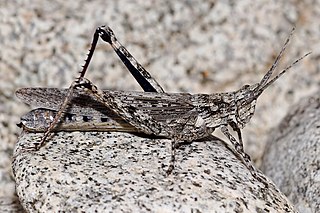
The Acrididae are the predominant family of grasshoppers, comprising some 10,000 of the 11,000 species of the entire suborder Caelifera. The Acrididae are best known because all locusts are of the Acrididae. The subfamily Oedipodinae is sometimes classified as a distinct family Oedipodidae in the superfamily Acridoidea. Acrididae grasshoppers are characterized by relatively short and stout antennae, and tympana on the side of the first abdominal segment.

Bandwings, or band-winged grasshoppers are the subfamily Oedipodinae of grasshoppers classified under the family Acrididae. They have a worldwide distribution and were originally elevated to full family status as the Oedipodidae. Many species primarily inhabit xeric weedy fields, and some are considered to be important locusts:
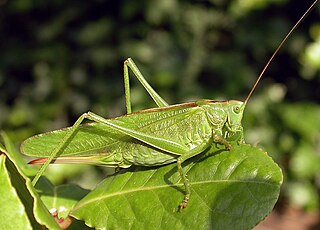
The Tettigoniinae are a subfamily of bush crickets or katydids, which contains hundreds of species in about twelve tribes.

Stenobothrus is a genus of grasshoppers found in Asia, Europe, and North Africa.

The Phaneropterinae, the sickle-bearing bush crickets or leaf katydids, are a subfamily of insects within the family Tettigoniidae. Nearly 2,060 species in 85 genera throughout the world are known. They are also known as false katydids or round-headed katydids.
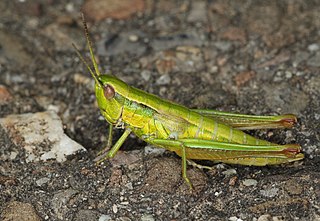
Gomphocerinae, the slant-faced grasshoppers, are a subfamily of grasshoppers found on every continent but Antarctica and Australia.
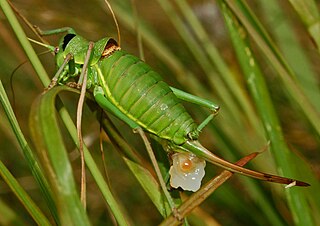
Ephippiger is a bush cricket genus described by Berthold in 1827, belonging to the family Tettigoniidae, subfamily Bradyporinae and tribe Ephippigerini.
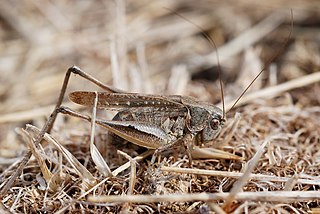
Platycleis is a genus of bush crickets described by Fieber in 1853, belonging to the subfamily Tettigoniinae. The species of this genus are present in Europe, North Africa and temperate Asia.

Tettigonia is the type genus of bush crickets belonging to the subfamily Tettigoniinae. The scientific name Tettigonia is onomatopoeic and derives from the Greek τεττιξ, meaning cicada.

The dark bush-cricket is a flightless species of European bush-cricket; it is the type species of its genus with no subspecies.
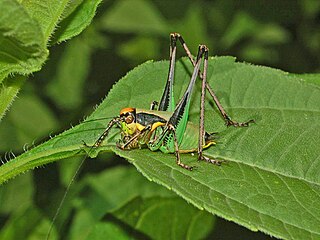
Eupholidoptera is a genus of bush crickets belonging to the subfamily Tettigoniinae.
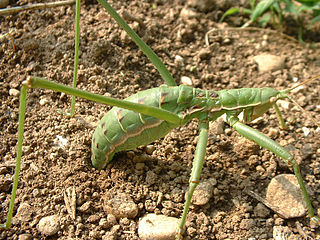
Saga is a genus of bush crickets or katydids containing around 15 species as of 2018. It is the only genus in the tribe Sagini and belongs to the subfamily Saginae. Species have been recorded from mainland Europe and western Asia.

Leptophyes is a genus of bush-crickets found in Africa, Asia, and Europe. The genus was erected by Franz Xaver Fieber in 1853.

Rhacocleis is a genus of bush crickets in the subfamily Tettigoniinae and tribe Platycleidini. Species can be found in southern Europe, the Middle East and North Africa.
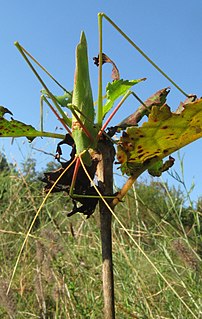
Acrometopa is a genus of bush crickets in the subfamily Phaneropterinae. Species in this genus are found in Europe and the Middle East.

Eyprepocnemis is a genus of grasshoppers in the subfamily Eyprepocnemidinae with species found in Africa, Southern Europe through to tropical Asia.

Sphingonotus is a genus of grasshoppers in the family Acrididae, subfamily Oedipodinae, found in Europe Africa, Asia and Australia.

Nocarodes is a genus of grasshoppers in the family Pamphagidae. There are at least 20 described species in Nocarodes, found in southeastern Europe and southwestern Asia.

Poecilimon is a genus of bush crickets in the subfamily Phaneropterinae and tribe Barbitistini. Species can be found in: central and Southeast Europe, the south of the European part of the former USSR, Asia Minor, Syria, Palestine, the Caucasus, Persia and extends in Central Asia to the Altai mountains.

Gampsocleis is a genus of bush crickets in the subfamily Tettigoniinae and tribe Gampsocleidini.




















